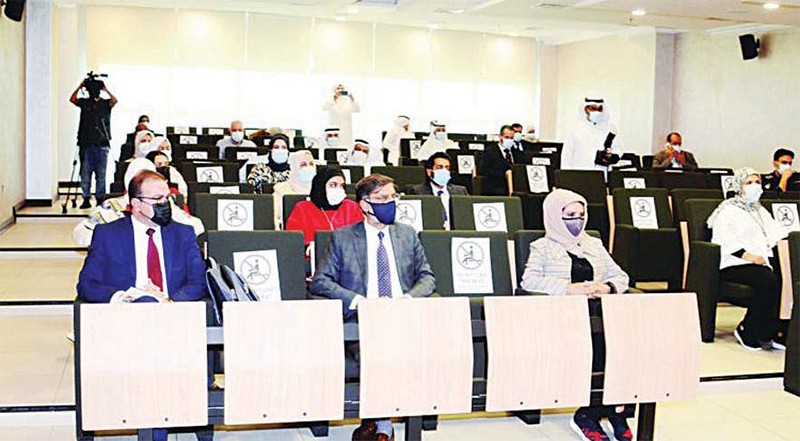24/06/2021
24/06/2021
KUWAIT CITY, June 24: The World Health Organisation (WHO) commended on Thursday the Kuwaiti government's COVID-19 vaccination arrangements as operating under the "highest safety standards." "I am genuinely impressed with the efficient organisation of the vaccination centers and commitment of the staff," WHO representative in Kuwait Dr Assad Hafeez said during a visit to two such facilities, accompanied by another two regional WHO officials. "I am thankful for their help in vaccination while applying the highest level of professionalism to ensure the safety and efficacy of vaccines," added Dr Hafeez in a statement by WHO.
The WHO representative's visits extended to the Kuwait International Fair centre in Mishref, which has been offering free vaccinations to nationals and expatriates alike since December 2020, alongside the Sheikh Jaber Al-Ahmad Al-Sabah Causeway drive-in center, introduced in May, this year. Both makeshift centres have the capacity to innoculate a combined number of over 30,000 people a day, operating under government COVID-19 regulations, approved by WHO. WHO went on to describe the centres as being "comparable to any other such facility around the globe," pointing out the leadership of Health Minister Dr. Bassel Al-Sabah on the matter.
The Ministry of Health organized the first workshop of the Permanent Office of the World Health Organization in Kuwait, in the presence of the Director of the Department of International Health Relations, Dr Rehab Al-Watian, the Permanent Representative of the World Health Organization for the Eastern Mediterranean Region in Kuwait, Asaad Hafeez, the epidemiologist at the WHO Regional Office, Dr Amjad Al-Khouli, and the WHO’s liaison officers in the country.
Dr Al-Watian said in a press statement on the sidelines of the meeting that this workshop is the first after the official opening of the office of the permanent representative of the World Health Organization in Kuwait last week in the presence of the Minister of Health Sheikh Dr Basil Al-Sabah. She pointed out the primarily purpose of the workshop is introductory, as the WHO permanent representative in Kuwait, Dr Hafeez liaises with the liaison officers in the Ministry of Health, and they are the point of contact between the Kuwaiti Ministry of Health and the WHO, as they are responsible for submitting the reports, information and numbers required from the Ministry to the World Health Organization. She explained the Ministry of Health includes many sectors, and each sector has a number of liaison officers who work in a joint program between the Kuwaiti Ministry of Health and the World Health Organization, and these programs are vital and organized and require interaction and permanent responses.
Dr Al-Watian confirmed the depth and strength of the relations between the Ministry of Health and the World Health Organization, and this relationship was crowned by the inauguration of the permanent office, noting that Kuwait is an official member of the organization since 1960, and that it is ranked 19th among 22 countries in the eastern Mediterranean, and that the presence of an office of the organization in the country will document the relationship and will increase communication and continuous follow-up and will undoubtedly give clear results and shed light on Kuwait’s efforts.
In turn, Dr Hafeez said: “We are in the process of introducing the liaison officers in the Kuwaiti Ministry of Health to the organization’s programs in full coordination with the ministry in all its departments in various disciplines.” He explained that there is a set of very precise rules on the basis of which work is being done for coordination and cooperation between the organization and the ministry to enhance joint cooperation to reach more positive results. He pointed out that in the interest of the World Health Organization to consolidate cooperation and support, qualify and prepare the health system in Kuwait calling the relationship with the “organization” deep and extends for decades, pointing out that the initial basics in the areas of cooperation and technical support by the World Health Organization and how to receive programs will be discussed.



